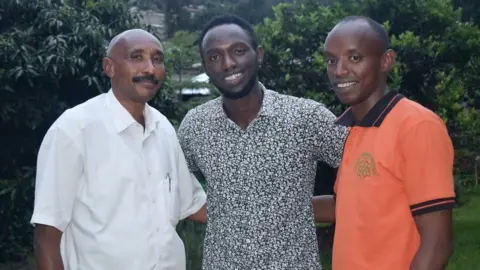The Rwandan radio show which brought children back from the dead
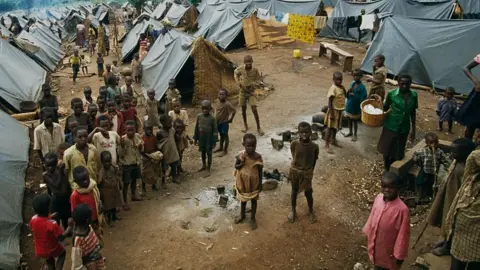 Getty Images
Getty ImagesThis is the story of three little boys almost lost forever in the wave of people fleeing the violence which engulfed Rwanda in 1994.
It is also the story of how a radio broadcast cut through the fear and the chaos to reach across borders and decades to bring them from the dead, and home to their families.
"It restored hope among us," Theogene Koreger told the BBC, 25 years after his nephews disappeared.
"The message reached where we could not reach - they delivered messages we could not have got otherwise."
This story begins at the end of the genocide in Rwanda. One hundred days of murder and rape had finished with an estimated 800,000 Tutsis and moderate Hutus dead.
Hundreds of thousands more had fled their homes in search of safety and, among those, were an estimated 120,000 children who had become separated from their families.
Mugabo and his little brother Tuyishimire were just two of the 40,000 who had crossed the border to find safety. And Mugabo - at just seven years old - had become the head of his tiny remaining household.
After all, the last job his mother had given him before she had died was to look after Tuyishimire, who was just a toddler.
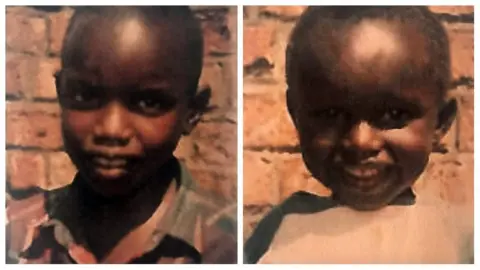 Red Cross
Red CrossBut now they were alone in what is now the Democratic Republic of Congo, and struggling to survive in one of the refugee camps which had sprung up along Rwanda's borders.
"We could live on begging, tomatoes and fish," he recalls, a note of defiance - and pride - still in his voice 25 years later.
But the camps were dangerous places: the million or so refugees who had sought shelter there may have survived the genocide, but now there was cholera and dysentery to contend with.
Tens of thousands more would die before they were able to go home.

"The camps were bad, bad. There were diseases everywhere," Rene Mukuruwabu tells the BBC as he sits in a garden in Kigali, miles from the place where he and his family ended up when they were forced to flee.
Rene, in some ways, was one of the lucky ones: his family was intact when they arrived in Tanzania in 1994.
But then his father disappeared and his mother, who had set up a clinic to help the sick, became one of the camp's many deaths.
Within the blink of an eye, his family had become just him, his little brother Fabrice, and their step-sister.
And it would take just another moment for five-year-old Rene to find himself entirely alone.
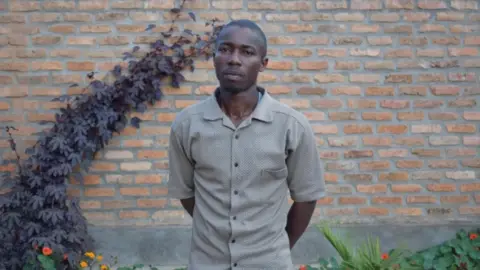
After the genocide ended in July 1994, humanitarian agencies were faced with a raft of problems - how to heal the wounded, how to feed the hungry, how to house the homeless.
And how to reunite lost children with their families.
But - in a time long before the internet or mobile phones, when people have run away with nothing, when a country is in turmoil - how do you start to find what family they had left?
"It was the idea of Neville Harms, who was the manager of the BBC's Swahili service in 1994," Ally Yusuf Mugenzi explains. "He decided to establish a lifeline project to reunite families which were missing each other."
And so a plan was hatched to create a short, 15 minute programme which would be broadcast by the BBC into Rwanda, and the surrounding countries. It would start with a news bulletin and be followed by people appealing for their missing relatives.
Actually putting it together was, of course, not as simple, and involved working together with the Red Cross, which would record and then send short tapes to the studio.
"We would run the voices of people from these camps," explained Mugenzi, who became one of the show's two presenters.
It would end up being named Gahuzamiryango, meaning "the unifier of families" and was first broadcast 25 years ago. It was supposed to last for just three months. That deadline, however, quickly came and went.

More on the genocide:

The last time Rene laid eyes on his family members, they were heading back towards Rwanda. And then, they were gone.
"Can you imagine a kid who gets lost?" he asks. "I was crying, losing hope. I could see many people around but I could not see any of my relatives."
By the time he was swept up by aid workers, he had lost the ability to speak.
"They asked for my name, my address. But because of fear and losing hope and trust I could not talk."
He did not speak again for months, as he moved through orphanages filled with children who, like him, had found themselves alone in the world.
But then - when his world had settled into steadiness with an adoptive family - a voice reached out across the airways.
"My neighbour came running to tell me they were reading my name on the radio," he remembers. He ran to his neighbour's house to hear for himself.
"They were reading names - my names."

"I couldn't remember my names, but I could remember my young brother's name," Mugabo reveals, as he shows the BBC a picture of the two small boys the Red Cross discovered living alone in DR Congo.
But it was enough: back in Kigali, their uncle Theogene heard the announcement on the radio.
"When I heard from the radio I thought it was a message from heaven," he says, the memory still making him smile almost a quarter of a century later.
"That's because people who were here in Rwanda, had no communication, we had no messages from anywhere."
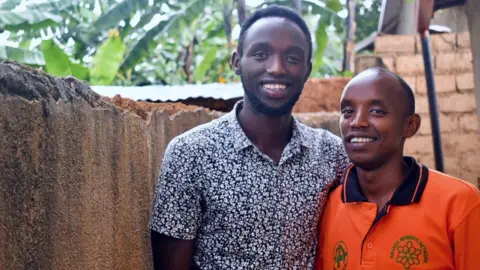
But hearing the names was just the first part of a long journey to bring the boys home. The country was still riven by conflict, and the roads were dangerous.
But mainly, the boys were scared to come back.
"I saw the letter of my uncle that was in Rwanda and that he wanted to see us. But I refused," Mugabo says.
"I saw my father die, I saw my mother die, so why should I go back?"
And there was one more thing: his uncle was a soldier with the Rwandan Patriotic Front - the Tutsi rebel army which took power in Rwanda, ending the genocide. And those soldiers, Mugabo had been taught growing up, were cockroaches who had tails.
But his uncle had one more card to play: he sent a picture of himself and another of their brothers. It was enough: after a year in the jungle, Mugabo and Tuyishimire went home.

Rene doesn't know now why he didn't do anything when he heard his names on the radio all those years ago. Fear, possibly: he knew he had a happy life with his adoptive family. Perhaps that was safer.
And yet, it gave him a sliver of hope that maybe someone out there was looking for him.
"It was always on my mind," he says now. "I was wanting to hear it again on the radio but it never came."
It made him hold onto his name, even when his adoptive mother suggested he might like to change it so he could truly be part of the family.
And so, when he entered it into Facebook more than 15 years later, he did wonder if someone might recognise it. He didn't have to wait long for his answer.
"I put my name on on Saturday, and on Sunday, they found me."

"In 1995 we did try to find him," Rene's uncle Charles tells the BBC. "We did not find him, but we did not forget him. We were thinking he was dead. We left him in history.
"And then, 18 years after, it was like a miracle for us to see he was still living."
It was Rene's cousin Olivier who found him on Facebook - it was him who got to tell his family the boy left in history had returned. He was no longer a boy, but the family were in little doubt it was him.
"You look like your younger brother," Olivier told Rene the first time they met. "It is you, no doubt."
This was the first time since the pair were separated all those years ago that Rene knew for sure his brother had survived.
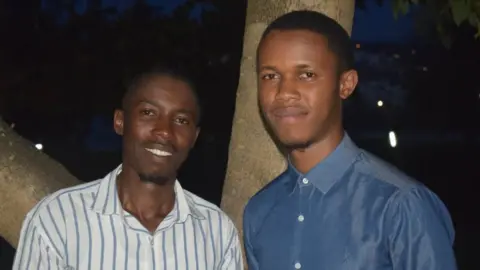
The radio broadcasts were not the only way the Red Cross and other aid agencies tried to reunite children with the families. Photos were shared, lists were made and children were even driven around from village to village in order to find their families.
In the end, Espèrance Hitimana, now the protection data manager at the International Committee of the Red Cross in Kigali, estimates they managed to reunite 70,000 people.
But the work still continues.
"We still see about two or three cases a month," she says. "Some cases we succeed and we find the families. Other cases we don't have any news. We don't have any choice but to tell them we have done what we could."
As for the BBC's radio service, that is also still going - although it no longer reads out the names of the lost.
Nowadays, it boasts a an interactive programme "Imvo n'imvano", and has turned its attentions to digital.
Mugenzi - who now runs what became the BBC's Great Lakes Service - beams with pride when he thinks about what they have achieved over the last 25 years.
"It is the platform which has been giving the news which is true, which is fair and which is independent for all these years," he said.
But he knows people still remember how it all started - people like Rene, who now lives with his uncle in Kigali, near to his younger brother, and like Mugabo and Tuyishimire, who live within walking distance of their uncle Theogene.
And it is Theogene who sums up exactly what those broadcasts meant.
"Without the BBC," he says simply, "they would have died."
